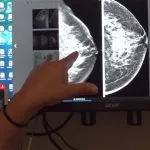
MONTPELIER, Vt. (WCAX) – New technology is available to help doctors treat cancer patients, Now, advocates are trying to convince Vermont lawmakers to mandate insurance coverage for it, but providers say it will be costly.
“It was 1993. I got a phone call that I had cancer,” recalled Tracy Devarney.
The mother of two was 18 weeks pregnant and working a full-time job when she started chemo. She eventually beat it, but 30 years later got another call. This time it was breast cancer.
“I spent a few weeks crying and trying to get my head wrapped around what I was going to go through because unfortunately, I knew what it meant,” Devarney said. Her doctor recommended a biomarker test to see if chemotherapy was right for her specific cancer and it turned out not to be. “I was saved months — or however long the chemo was going to be –and just have radiation and surgery, which is a huge difference and was a huge relief.”
Biomarker tests look for signals in the body that inform doctors on how to diagnose, monitor, and treat patients. Right now, insurance companies cover some tests, but on Wednesday the American Cancer Society asked Vermont lawmakers to mandate that state-involved insurance cover more.
“It’s so important to helping cancer patients live longer and better and improving quality of life and health outcomes,” said the society’s Hillary Gee Geockner. She says almost three-quarters of major health insurance policies have inadequacies when it comes to test coverage, creating socio-economic disparities for who can receive the right treatment. “To an insurer, per biomarker test, it’s $224. Now, the out-of-pocket cost to a patient — if the insurance doesn’t cover a test — might be five, 10, $20,000.”
Fifteen states have enacted legislation to expand insurance coverage of comprehensive biomarker testing, but Geockner says insurance lobbyists in every state have opposed the expansion by arguing that it’s too costly and would increase costs for taxpayers.
Devarney thinks it’s worth it. “Everyone should have the same chance that I did,” she said.
